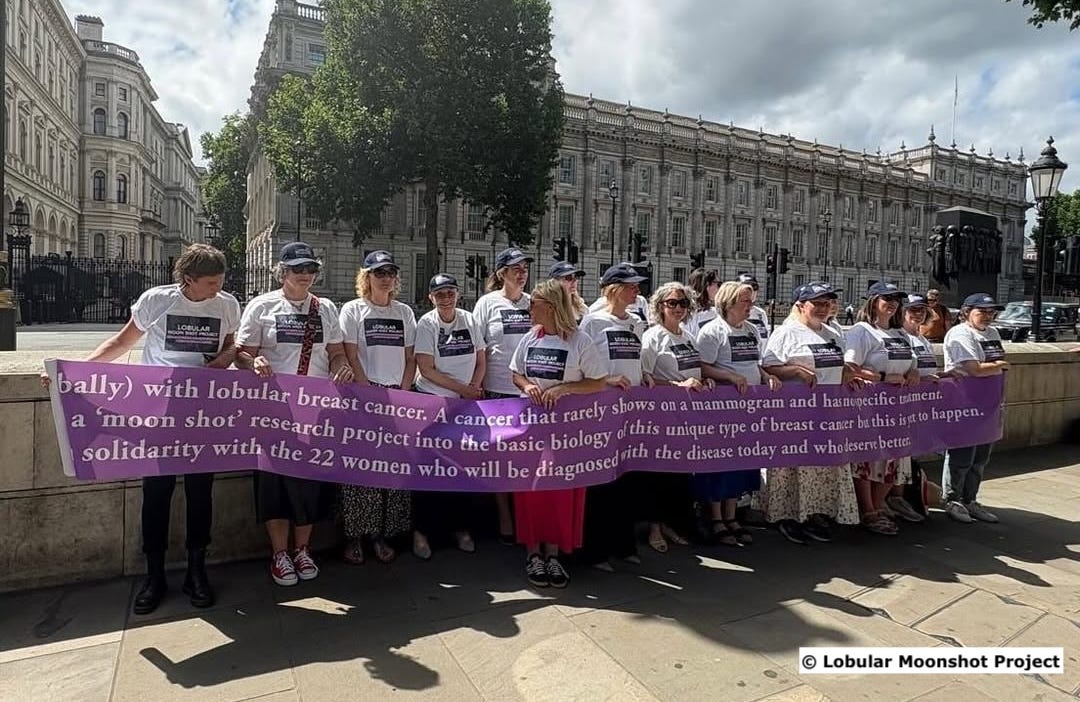Breast cancer has twice hit my family and each time, both women have been caught early and recovered. In fact,thanks to screening programmes, public health messaging and the amazing research that’s been done into treatments, the majority of women are expected to survive their disease by many years.
Former airline pilot Dr Susan Michaelis, however, is not one of them.
In 2013, Susan went for a mammogram after noticing a small spot on her breast. Despite being given the all-clear, she continued to feel that something wasn’t right. When the spot grew, she went back for a biopsy, which revealed she had a form of the disease known as invasive lobular breast cancer (ILBC).
A further ultrasound failed to find anything, but then an MRI revealed she had more than 2cm of cancer. She underwent a double mastectomy – only to discover that what the MRI had estimated at 2.6 cm was actually 7cm.
What is invasive lobular breast cancer?
Around 80% of breast cancers are ductal, which means the disease begins in their milk ducts. ILBC, however, forms in small milk-producing lobules – and that distinction matters profoundly.
Ductal breast cancer most typically presents as a lump and that makes it easy for a mammogram or ultrasound to catch.
In contrast, lobular breast cancer spreads in strands like a spider’s web, evading detection through regular screening. As a result, it is often not diagnosed until the disease is advanced. (Invasive means it has the possibility of spreading to other parts of the body.)
ILBC has been known about for decades and is the second-most common form of breast cancer. But despite this, there has been very little research or funding into how to fight it.
Treatment and screening guidelines are still based on the more common ductal breast cancer, a “one-size-fits-all” approach that leads to delayed diagnoses, misdiagnoses and missed chances for early intervention.
The Lobular Moonshot Project
Three years after her initial diagnosis and treatment, Susan found another spot on her breast. She underwent various hormone treatments but then, in 2021, it not only returned, but a full-body MRI found it had spread to other parts of her body and she had Stage IV cancer.
After flying in the skies, Susan decided to shoot for the moon. While talking with a cancer expert, she pointed out how the race to the moon was won in only eight years. With a similar “moonshot”, said the expert, they could solve the ILBC problem – but it came down to money.
That was when Susan, together with her film-maker husband Tristan Loraine, set up the Lobular Moonshot Project, with the aim of raising £20m to devote entirely towards research into the disease.
What the campaign is demanding
The project is pushing for bold, concrete change:
Dedicated research funding for lobular biology and detection.
Updated imaging protocols, including routine MRI, to catch ILC early.
Specialist training so clinicians recognise lobular’s unique patterns.
Clinical trials tailored to lobular disease – not based on ductal models.
Patient-led policy, ensuring women with ILC shape the care they receive.
‘My Journey with Lobular’
Despite Susan continuing cancer treatment, she truly is a force in the campaigning world. On Tuesday, she joined 21 other women taking part in a silent vigil outside Downing Street (pictured above), their numbers representing the 22 women diagnosed with the disease in the UK every day.
And today – Thursday 24 June – sees the premiere of Our Journey with Lobular Breast Cancer – Tristan’s moving documentary bringing to light the voices of Susan and other “Lobular Ladies” who’ve been overlooked, misdiagnosed, or failed by the system.
This isn’t just a documentary – it’s a campaign born from heartbreak and determination, a call to action.
I was lucky enough to talk to Tristan last week about the making of the film, the “trickster” that is ILBC and why this issue matters so much (be kind – unlike him, I’m not a film-maker!).
We may have been talking breast cancer, but there are themes that all women’s health campaigners will recognise: the neglect, the lack of funding, the reliance on outdated models. It’s all connected and it’s fixable – if we choose to act.
So watch the interview. Share it. Talk about it. And if you can, support the Lobular Moonshot Project. Because Susan’s right: if we could get to the moon in eight years, we can tackle this. We just need the political will – and the funding.
For Susan, for the 22 women diagnosed every day, and for every woman still being told: “It’s probably nothing” – let’s reach the moon.







Share this post